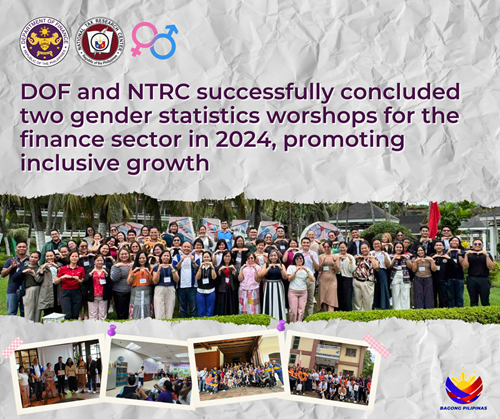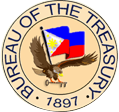Frequently Asked Questions
What is NTRC's involvement in current tax issues?
NTRC’s involvement in current tax issues includes the following:
1. Provides comments on House Bills and Senate Bills on tax proposals
2. Prepares facts, figures and notes about the concerned tax
- Briefer/Notes about the concerned tax
- Profile of affected stakeholders
- Historical amendments introduced to the concerned tax
- Revenue collection on the tax
- Revenue estimates of the tax proposal
- Other related statistics concerning the tax proposal and practices in selected countries
3. Provides technical assistance to the DOF during the deliberations conducted by the House and Senate Committees on Ways and Means on tax bills
4. Provides comprehensive study or assessment of concerned taxes and recently enacted tax laws.
On the other hand, NTRC’s Inter-Agency involvement relative to fiscal matters is as follows:
1. The NTRC acts as the Technical Secretariat of the Fiscal Incentives Review Board (FIRB) which grants tax subsidy to Government-Owned or Controlled Corporations (GOCCs) and the Commissaries in accordance with Executive Order (EO) 93, series of 1986 and the annual General Appropriations Act (GAA).
2. The NTRC serves as the Secretariat to the Task Force on Fees and Charges which monitors the compliance of collecting agencies to Administrative Order (AO) No. 31 as implemented by DOF-DBM-NEDA Joint Circular No. 01-2013 on the rationalization of fees. As the Secretariat, it extends technical assistance to fee collecting agencies upon request, prepares minutes, status reports and other necessary documents for the Task Force members, and prepares reports, updates and comments on proposed measures involving collection from fees, among others.
3. The NTRC also acts as consultant to both the Technical Committee on Real Property Valuation (TCRPV) and Executive Committee on Real Property Valuation (ECRPV) of Revenue District Offices (RDOs) and Revenue Regional Offices (RROs) of the Bureau of Internal Revenue (BIR). As consultant, it attends meetings and public hearings pertaining to determination/revision of zonal values of various real properties, requests for revaluations; and participates in ocular inspection of subject properties.
4. The NTRC is a member of the Technical Working Committee on the Exchange of Information (TWC-EOI) which reviews, evaluates and provides analysis on issues relating to the Philippines’ compliance to international standards on the exchange of tax information.
What are NTRC's comments on the following tax proposals?
The following are the comments of the NTRC on certain tax proposals filed in Congress, viz.:
1. On Fiscal Incentives Rationalization [Senate Bills (SBs) 35, 987, 2048 and Unnumbered SB (DOF-Version)]
- Supports the objective to rationalize the present fiscal incentives in the country by providing clear-cut incentive packages to registered enterprises that aim to minimize wasteful tax breaks and to ensure efficient provision and management of investment incentives without reducing the country’s attractiveness to investors.
- Supports the inclusion of the Secretaries of National Economic Development Authority (NEDA), Department of Finance (DOF) and Department of Trade and Industry (DTI) to sit as members in the governing boards of all Investment Promotion Agency (IPAs) to ensure that the grant and administration of investment incentives will be in accordance with the country’s medium term economic development plan, contribute to the growth and competitiveness of industries and be fiscally-sustainable.
- Supports the replacement of the annual Investment Priorities Plan (IPP) with the Strategic Investment Plan (SIP) which will be valid for three (3) years.
- Supports the establishment of a comprehensive database on investment and incentives that will serve as the complete repository of all investment and incentives data concerning all IPAs. The database is necessary to ensure that data are available in the review and evaluation of government’s tax incentive policy and the formulation of reforms, if needed, to make incentives a more useful tool for growth and development.
- Considers the need to repeal special laws with tax incentives provisions that may be contributing to wasteful tax incentives estimated at one percent of gross domestic product (GDP) revealed by a World Bank suvey.
2. On Tax Incentives Monitoring and Transparency Act (TIMTA) (HB 2492, SBs 469 and 1187 and Unnumbered HB-DOF Version)
- Supports the objective of the TIMTA to create a Tax Expenditure Account (TEA) in the national budget that will effectively account for the utilization of public funds, including foregone revenues through the grant of tax incentives to a number of business and activities.
- Supports the provision on the administration, implementation and monitoring of the availment of tax incentives to ensure a better review and evaluation of government’s tax incentives policy and the formulation of reforms, if needed, to make tax incentives a more useful tool for growth and development.
- Through TIMTA, the government will be able to track tax incentives that it gives out and properly evaluate which incentives most effectively spur economic development instead of the outright grant of tax incentives.
.png)













